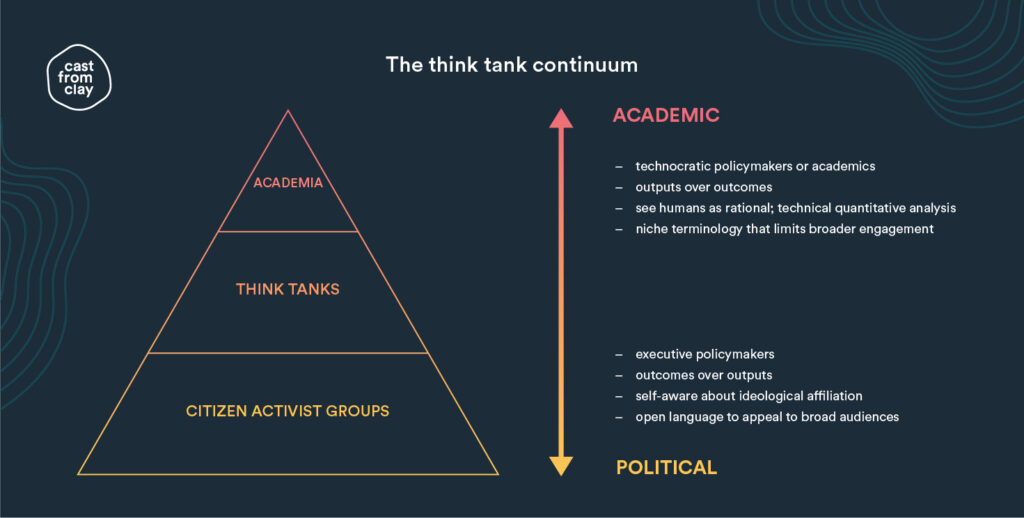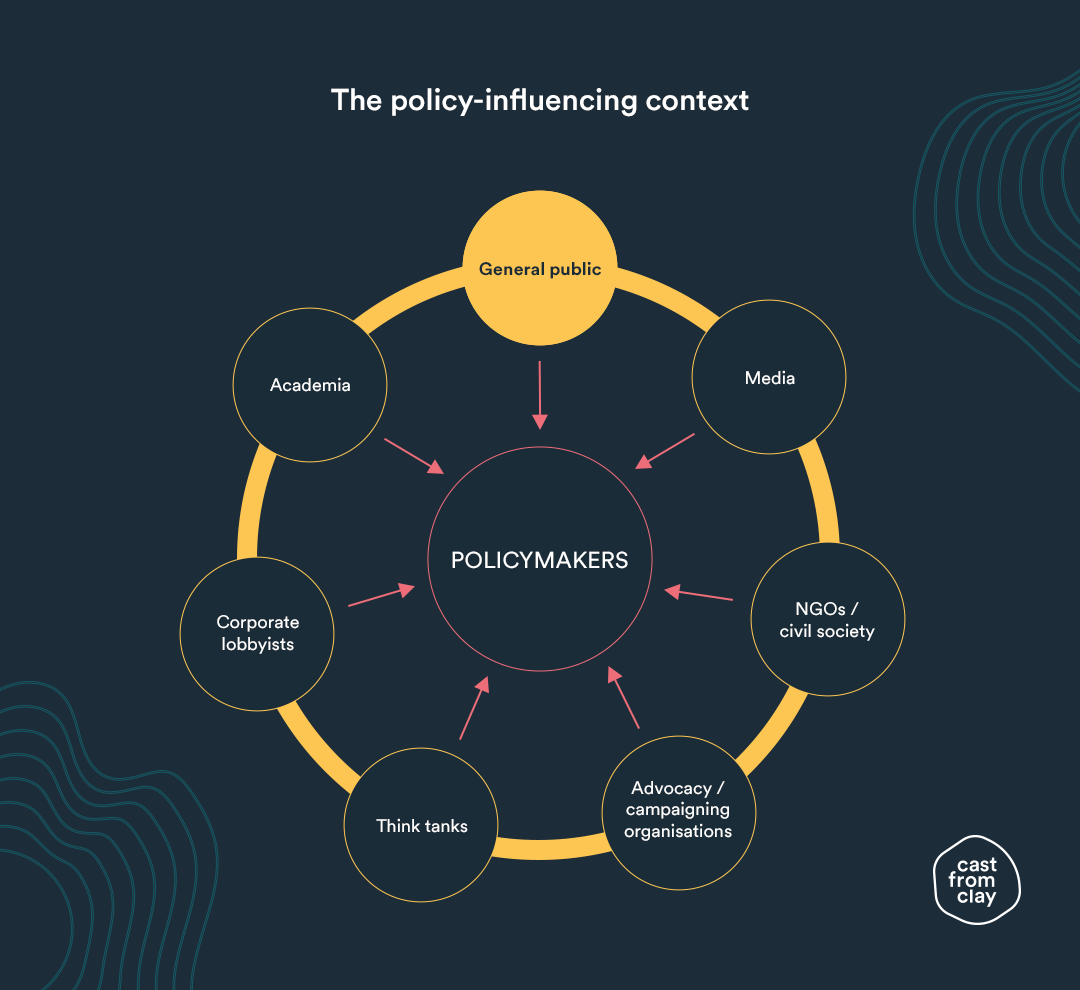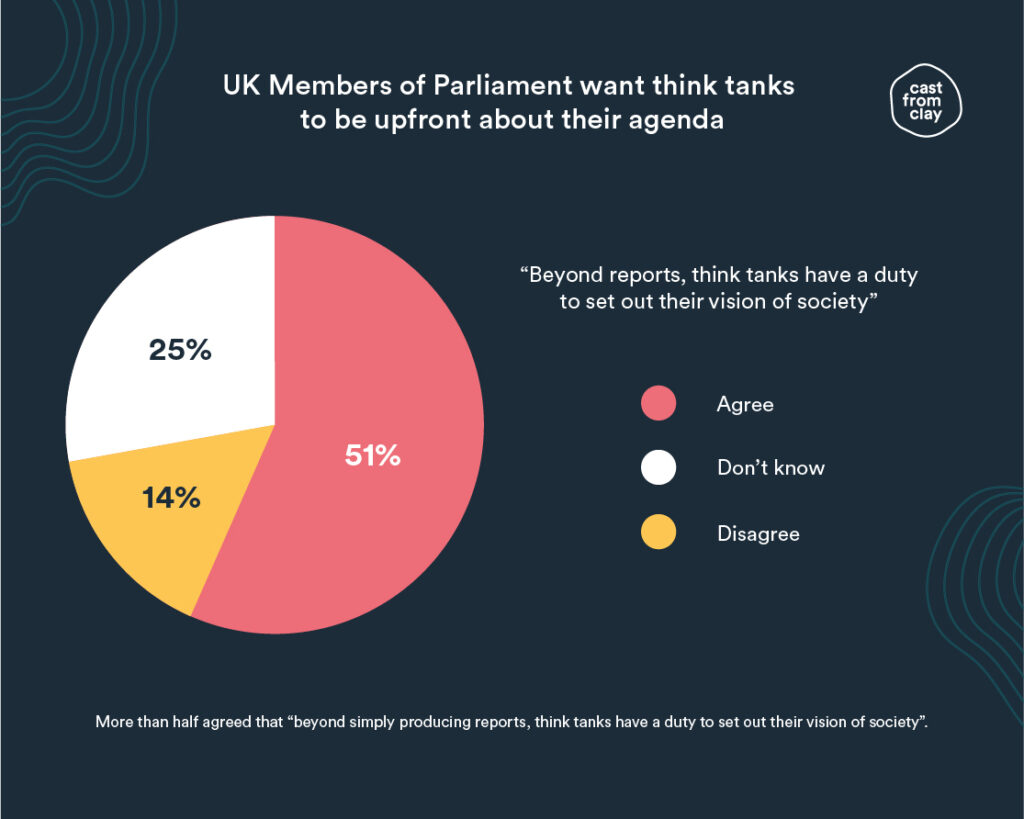This piece was originally written in May 2021. In the four and a half years since, the number of think tanks moving away from the think tank moniker has increased. We have advised a number of organisations on that journey. If you are considering such a chance and are looking for advice, you can arrange a 15 minute introductory call with us here.
What is a Think Tank – Defining their role
These organisations come in many forms and sizes, and cover a range of fields, from national security to the environment and food to international development. They sit at differing points on the political spectrum. The bond between them all is that they conduct research, and use that research in the service of policy influence.
In many of the presentations we’ve given on perceptions of think tanks we have asked the question, “What would be lost if think tanks disappeared tomorrow?” The intent is to get to the essence of think tanks; to identify the role think tanks serve in society.
The answers (from think tankers) typically include:
“Policymakers would make bad decisions without us – we give them ideas and we inform them.”
“The media would lack detail or substance on policy considerations – we explain the nuance.”
“People that need to meet, wouldn’t meet – we provide a forum.”
“Ideas that need to be heard, wouldn’t be – we promote new ideas and ways of thinking about issues.”
“New ideas and policies would lack substance – we apply research rigour to real-life policy challenges.”
Think tanks usually provide several, if not all, of the above services, but their prioritisation differs.
Think tanks such as the Atlantic Council pride themselves on their convening power. For them, building relationships among their constituent stakeholders is an integral part of their role.
For others, like the Institute for Fiscal Studies, the priority is much more on influencing politicians and the media by promoting a certain point of view.
And for some, like the Pew Research Center, the priority is on producing the research – and less what happens with it.
The think tank continuum
The answers have led us to think about a think tank continuum. This continuum neatly nestles into Richard Fink’s Hayek-influenced model of policy influence, Fink’s pyramid, that he elaborated in “The Structure of Social Change” in 1996.
At the ‘higher’ end of this continuum are the more academic think tanks. They usually:
- engage more technocratic policymakers (eg civil servants) or academics
- think in terms of outputs rather than outcomes (eg publishing a report)
- see humans as rational entities able to make the “right decision” if they have the “right information” – often technical quantitative analysis
- use acronyms and niche terminology; language that has the effect of limiting broader engagement
At the other end of the continuum are the more political think tanks. They usually:
- engage higher levels of executive policymaking (eg elected politicians)
- think in terms of outcomes rather than outputs (eg achieving policy change)
- have a closer relationship with the public; tend to use more open language that engages a broader audience
- are more self-aware – and transparent – about ideological affiliation

This is not a perfect model. There are contradictions and anomalies aplenty. Several think tanks sit on the academic end for some elements of the above lists, but on the political end for others.
Indeed, in some think tanks, specific programmes sit at one end, and others the opposite.
Wherever these organisations sit, there are challenges that are universal.
The policy context in which think tanks operate has changed
The world that the think tank was born into a hundred years ago has changed. The policymaking environment has changed. The focus of its communications models has altered. Its funding sources are more complex. And the sector has significantly grown.
Modern social media has wrought huge changes both in society and in policy influence. In addition to academia, think tanks, and citizen activist groups, we can consider the broader public, NGOs, lobbyists and the media as actors in the policy ecosystem.

Think tanks today have taken on these roles to differing extents. Many are now part-policy shop, part-media commentator, part-NGO coordinator, part-advocacy organisation.
That description is also true of research institutes at British universities.
It is true of many NGOs.
It is true of many lobbyists.
There difference between think tanks and these other organisations is often hard to identify and articulate.
Anne-Marie Slaughter’s recent call in the On Think Tanks conference for both a new name for think tanks, and a new conceptualisation of what they do, is on point. If not solely because the name fails to differentiate what these organisations do versus those that surround them. The think tank moniker is redundant.
The term itself is open for interpretation.
Unlike the use of “Institute” in the UK, for example by the Royal Institute of International Affairs, better known as Chatham House, there is no protection over use of the term “think tank”.
You could establish a “think tank” tomorrow, even if it had nothing to do with things think tanks do. Look at this marketing firm, for example. Perhaps because of that, there are many different kinds of think tank, and many different ways of conceptualising them.
What is clear is that we all think of them very differently.
Take Sir Robin Niblett, for example, the former Director of Chatham House. He called for think tanks in liberal democracies to be more overt in standing for their values in an excellent 2018 essay on the future of such organisations. Yet in an associated lecture he suggested that think tanks that “espouse an outright agenda” are not really think tanks.
But there are many organisations calling themselves think tanks that espouse an outright agenda. In the US, consider the Cato Institute, the Center for American Progress, or the American Enterprise Institute. In the UK, these include the Institute for Public Policy Research, Policy Exchange, or the Fabian Society. Are they not think tanks?
Arguably, it is the think tanks that sit outside the Overton Window that are filling the role of think tanks best: challenging accepted norms, pushing us to conceive of a different way of thinking about the issues we have today. Those tend to have a very clear agenda.
The words “agenda” and “advocacy” are often met with raised eyebrows. One concern is that it will devalue perceptions of research excellence (“How can our research be respected if we have a clear point of view?”).
Over the years we’ve talked to a number of typical policy stakeholders about this. The overarching conclusion is that they do not care what the ideological affiliation of a specific think tank is, as long as they are transparent about it and the research they produce is robust.
Journalists in particular do not buy the “objective and unbiased” line.
It’s not just journalists that want to know what a think tank’s agenda is up front. Cast From Clay conducted research among British MPs in 2019. More than half agreed that “beyond simply producing reports, think tanks have a duty to set out their vision of society.”

It is not enough for think tanks to remain sources of objective debate, if that is even possible.
They must recognise, engage with and promote their values, the vision of the world that they want to live and breathe. This inherently makes them agenda-setting entities.
Looking beyond the label
The reality is that if you don’t define your sector, others will do it for you. While the sector is umm-ing and ah-ing about what a think tank is, others are filling that vacuum.
But unlike NGOs or university research centres, most people do not understand what think tanks do. The public’s assumption is that if you are a think tank you are not to be trusted, your research is influenced by your funders, and you secretly lobby politicians and journalists at glitzy dinners.
There is a kernel of truth in those claims, though it is clearly a one-dimensional view of what think tanks do. The issue is that few are making the counter argument for the value that think tanks bring to our society.
Think tanks have a hugely positive influence. They forge new ideas, challenge, debate, and explore. Across the board, these organisations fill a crucial role in creating and sharing knowledge throughout our socio-political system.
But who is making this argument in any meaningful way? In the same way that Western democracies have returned to political tribalism over collective national identity, think tanks are seemingly only interested in their own individual interests rather than a dual-prong approach of individual and collective.
There is an irony that right-wing think tanks seem to be much more effective at collective action. There are several groups of right-wing think tanks in both the US and UK that meet to discuss strategies and tactics on a regular basis. The equivalent knowledge sharing on the left – as far as I am aware – is much more limited.
So today we are met with three truths:
1. The boundaries between think tanks and related organisations have faded.
2. People don’t know what think tanks do and can’t agree on what a think tank is, not even thinktankers.
3. Think tanks as an industry fail to make the positive case for think tanks.
In such a world, there seems to be little incentive to describe an organisation as a think tank. It provides little benefit.



